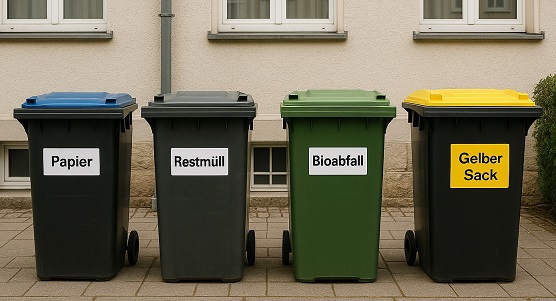
Ask any outsider what comes to mind when they think of Germany, and somewhere between “beer” and “efficiency,” the word “rules” is bound to appear. Germans have a reputation for following them, enforcing them, and – quite often – loving them. But where does this reputation come from? Why do rules, structure, and order play such a central role in German culture? And how does this phenomenon, known locally as Ordnungsliebe – “love of order” – shape daily life?
In this article, we’ll explore the roots and realities of Germany’s rule-friendly mindset, from its philosophical and historical foundations to the everyday rituals it informs. Whether you’re curious about quiet hours, recycling systems, or that infamous German queuing etiquette, this guide will help you understand the why behind it all.
What Is Ordnungsliebe?
The word Ordnungsliebe is uniquely German – a compound of Ordnung (order) and Liebe (love). But it’s not just a linguistic curiosity. It’s a deep-seated cultural value that reflects Germany’s long-standing appreciation for structure, clarity, and predictability.
This love of order manifests in countless ways:
- Punctuality as a point of pride
- Comprehensive recycling regulations
- Respect for pedestrian crossings
- Legal quiet hours, even in private homes
- A fondness for paperwork and documented rules
But Ordnungsliebe goes beyond checklists and traffic signs – it reveals a worldview where order equals fairness, and structure enables freedom.
The Cultural Roots: History, Philosophy, and Shared Experience
Germany’s relationship with rules is not new, nor is it arbitrary. Several historical and cultural forces have shaped this outlook:
1. The Legacy of Kant and German Philosophy
German thinkers like Immanuel Kant helped shape modern concepts of ethics and reason. Kant’s categorical imperative – the idea that we should act only according to rules we wish everyone to follow – is more than a philosophical abstraction. It still echoes in German attitudes toward law and civic behavior.
2. Fragmented States, Unified Law
Before unification in 1871, Germany was a patchwork of principalities, each with its own rules. The push toward national unity required systems that were fair, standardized, and enforceable. Bureaucracy became a tool for order and equality – not just control.
3. Postwar Rebuilding and Social Trust
After the chaos of WWII, Germans rebuilt not only their cities but their societal values. A shared commitment to order and responsibility became a cornerstone of democratic renewal. Rules weren’t just rules – they were a foundation for stability.
Where Ordnungsliebe Shows Up in Daily Life
You don’t have to look hard to see Germany’s love of order in action. It appears in the smallest interactions – and people notice when it’s not respected.
Recycling Systems
Trash in Germany isn’t just thrown away. It’s sorted into five or more categories – paper, plastic, bio, residual, and glass (by color). Germans don’t just follow these systems; they enforce them.
Quiet Hours (Ruhezeiten)
Vacuuming on Sundays? Playing loud music after 10 PM? Both are social (and sometimes legal) offenses. Germany’s Ruhezeiten reflect a shared commitment to mutual respect and mental peace.
Noise, Neighbors, and the Rulebook: How Quiet Hours Shape German Life
Queuing Culture
Germans rarely form obvious lines, but invisible order is maintained. Jumping ahead in a bakery or ignoring someone’s unspoken turn can spark glares – or a firm correction.
The German Art of Queuing: Order, Patience, and the Invisible Line
Bureaucracy
From registering your address to getting married, German bureaucracy is legendary. Frustrating? Sometimes. But Germans often see it as a necessary expression of fairness — if everyone follows the same rules, everyone gets equal treatment.
Why German Bureaucracy Is So Complicated (And Weirdly Comforting)
Traffic and Pedestrian Etiquette
Even when no cars are coming, Germans often wait for the green pedestrian light. It’s not about obedience — it’s about setting a good example for others, especially children.
Rules for the Greater Good: Ordnungsliebe in Traffic, Recycling, and Everyday Life
Rules as Social Glue
For many Germans, rules aren’t about rigidity – they’re about consideration. Following rules shows that you respect others, share common values, and understand the expectations of a shared society. In this sense, Ordnungsliebe functions as a kind of civic glue – keeping interactions smooth and public life predictable.
This is one reason Germans can appear “cold” or “strict” to outsiders: there’s often less small talk and more reliance on protocol. But underneath the structure is a strong sense of social responsibility.
When Rules Are Broken: The Flip Side of Ordnung
Despite the cultural love of order, Germans are not robotic rule-followers. Civil disobedience has a long tradition – from student protests in the 1960s to environmental activism today. Rules are respected when they make sense. When they don’t, they’re debated – often fiercely – through formal channels.
And there are moments when Germans bend rules quietly:
- Jaywalking in the early morning
- Ignoring a minor noise regulation in a trusted neighborhood
- Navigating bureaucracy through strategic questions
These small transgressions prove the rule – by showing that the order exists, even when it’s momentarily set aside.
Key Takeaways
- Ordnungsliebe is a deep-rooted cultural value that shapes German daily life.
- Historical events and philosophical traditions have reinforced the belief in structure and fairness.
- From quiet hours to traffic lights, following rules is a sign of social respect.
- Germans believe rules enable – not restrict – freedom and trust.
- Even when rules are frustrating, many Germans see them as necessary for fairness and equality.
Related Articles:
The German Art of Queuing: Order, Patience, and the Invisible Line
Punctuality in Germany: More Than Just Being on Time
Heimat: Why Germans Feel So Strongly About Their Hometown
Noise, Neighbors, and the Rulebook: How Quiet Hours Shape German Life
Why German Bureaucracy Is So Complicated (And Weirdly Comforting)
Rules for the Greater Good: Ordnungsliebe in Traffic, Recycling, and Everyday Life
Swabian House Rules: Why Germans Have So Many Signs
Bavarian vs. Prussian: Regional Rivalries and Cultural Identity
